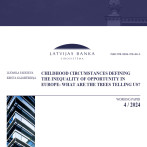Population's spending more cautious at the end of the year
Retail turnover in December dropped 2.0% month-on-month (seasonally adjusted data at constant prices). Within a month, the retail turnover dropped both in food product sales (-1.0%) as well as those of textiles, clothing, footwear and leather ware products (-1.2%), furniture (-11.9%) and automotive fuel (-4.1%). Year-on-year, the retail turnover grew 7.1%.
Before the data were received several factors suggested that there was reason to expect a rise in the December retail turnover. The weather conditions, for one, were advantageous in December for retail turnover growth. In December 2011 the average temperature was 2.1°C, whereas a year before it was substantially lower at -6.6°C., The warmer winter helped to substantially cut the costs of utilities. According to the information disseminated by the Central Statistical Bureau, the consumption of natural gas was 178 million m3 in December 2011 whereas in December of 2010 it was 272 million m3. Thus the consumption of natural gas (most of it is consumed in combined heat and power stations and the final consumption by households) dropped by one third. Thus, according to the information provided by "Rīgas Siltums", the billing total for December was on average 27.5% smaller than for December 2010.
The confidence indicators evaluated by the European Commission recently suggest that the mood of consumers has not deteriorated substantially despite the developments in the global economy. The January confidence indicators published today also support the above: the consumer outlook has again improved by 1.9 percentage points. Meanwhile, the retail trade confidence indicators, which, like the retail turnover indicators, have fluctuated over the last six months, in December improved substantially, which was a signal that in December a rapid improvement in retail turnover was expected. In January too the trade confidence indicator rose by 2.2 percentage points.
Despite all of the above factors, however, the retail turnover in December dropped. What is the explanation? It is most likely that households have learnt their lesson from the crisis and are acting somewhat against the cyclical trend of economic development – assuming that belts may have to be tightened some more in the future, they are spending more cautiously today.
An increase in the amount of deposits was observed in the banking system at large: they grew by 252 million lats. This means that the funds paid to the depositors of "Krājbanka" from the Deposit Guarantee Fund have already returned to the financial system and have not had a substantial impact on the size of retail trade, i.e. they have not been used to purchase durable goods.
In the development of retail turnover two factors will be of importance. First, the amount of free funds for consumption in winter will be determined by the weather: the colder it is and the greater the costs of utilities, the less funds households will have for consumption. As far as the annual perspective is concerned, the retail dynamic will primarily depend on the income of the population and people's expectations regarding the future. No statistics are yet available on the salary levels at the beginning of 2012, yet interviews with entrepreneurs suggest that a moderate rise in salaries can be expected in some businesses after the good financial year 2011. Consumer expectations in turn will be determined by the developments in the euro area. The correlation may not be direct, not all households follow the developments in the euro area, but their decisions regarding the future may be impacted indirectly.
Textual error
«… …»






